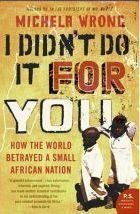What do you think?
Rate this book


432 pages, Paperback
First published January 17, 2005
Humility seems unlikely, but Eritreans no longer assume they know the answers to Africa's problems. As their present becomes murkier, they are losing the black-and-white certainties of the past. (389)Such writing, with its eye-roll-inducing cliches and generalities, should not be allowed in serious non-fiction. This book was unfortunately full of it, and inferior to Michela Wrong's other books about Africa (or at least to my favorable memory of them, which I am now questioning).